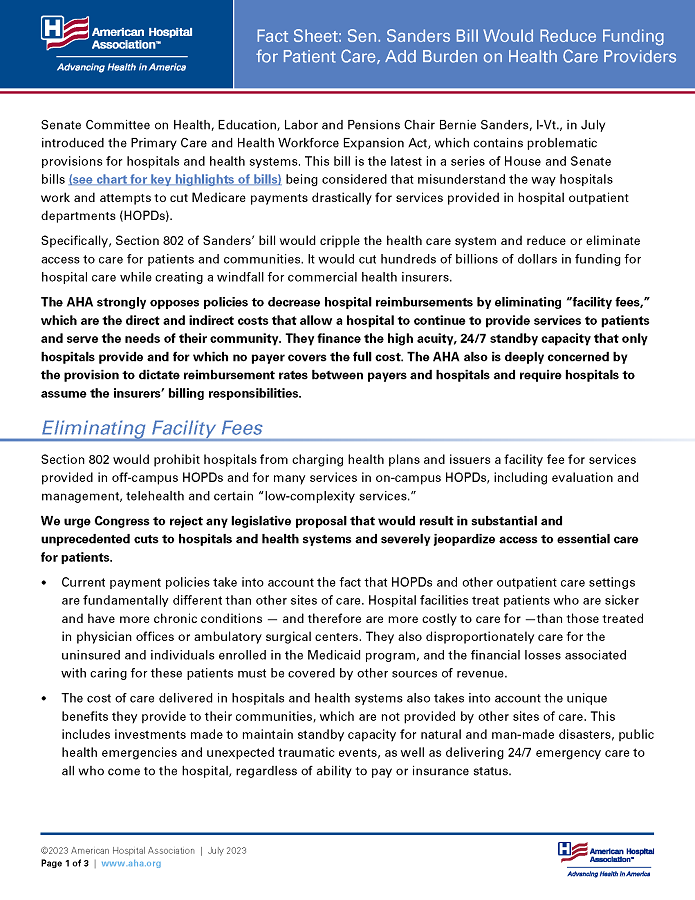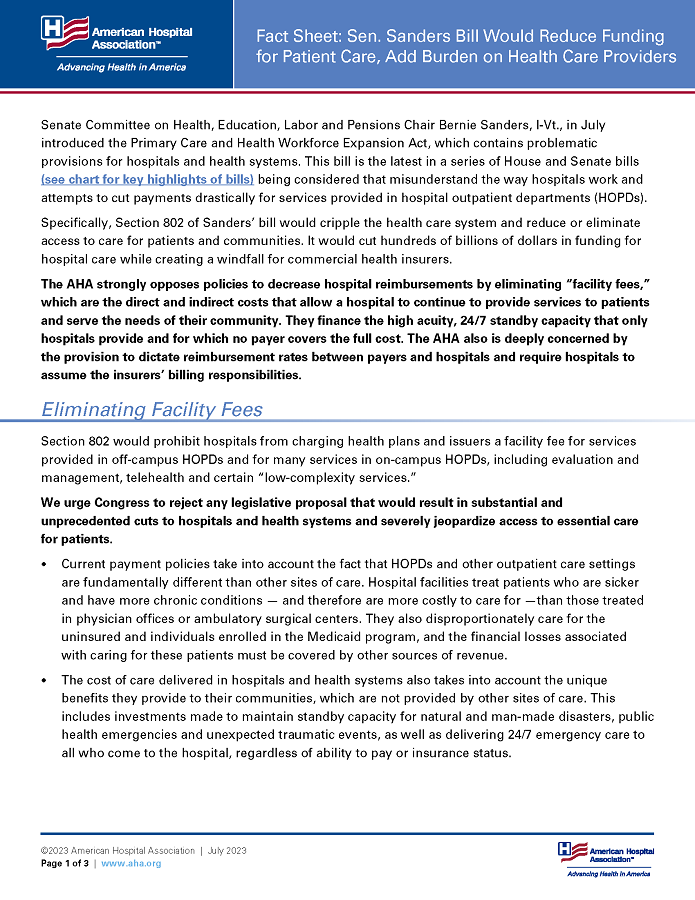

Fact Sheet: Sen. Sanders Bill Would Reduce Funding for Patient Care, Add Burden on Health Care Providers
Senate Committee on Health, Education, Labor and Pensions Chair Bernie Sanders, I-Vt., in July introduced the Primary Care and Health Workforce Expansion Act, which contains problematic provisions for hospitals and health systems. This bill is the latest in a series of House and Senate bills (see chart for key highlights of bills) being considered that misunderstand the way hospitals work and attempts to cut payments drastically for services provided in hospital outpatient departments (HOPDs).
Specifically, Section 802 of Sanders’ bill would cripple the health care system and reduce or eliminate access to care for patients and communities. It would cut hundreds of billions of dollars in funding for hospital care while creating a windfall for commercial health insurers.
The AHA strongly opposes policies to decrease hospital reimbursements by eliminating “facility fees,” which are the direct and indirect costs that allow a hospital to continue to provide services to patients and serve the needs of their community. They finance the high acuity, 24/7 standby capacity that only hospitals provide and for which no payer covers the full cost. The AHA also is deeply concerned by the provision to dictate reimbursement rates between payers and hospitals and require hospitals to assume the insurers’ billing responsibilities.
Eliminating Facility Fees
Section 802 would prohibit hospitals from charging health plans and issuers a facility fee for services provided in off-campus HOPDs and for many services in on-campus HOPDs, including evaluation and management, telehealth and certain “low-complexity services.”
We urge Congress to reject any legislative proposal that would result in substantial and unprecedented cuts to hospitals and health systems and severely jeopardize access to essential care for patients.
- Current payment policies take into account the fact that HOPDs and other outpatient care settings are fundamentally different than other sites of care. Hospital facilities treat patients who are sicker and have more chronic conditions — and therefore are more costly to care for —than those treated in physician offices or ambulatory surgical centers. They also disproportionately care for the uninsured and individuals enrolled in the Medicaid program, and the financial losses associated with caring for these patients must be covered by other sources of revenue.
- The cost of care delivered in hospitals and health systems also takes into account the unique benefits they provide to their communities, which are not provided by other sites of care. This includes investments made to maintain standby capacity for natural and man-made disasters, public health emergencies and unexpected traumatic events, as well as delivering 24/7 emergency care to all who come to the hospital, regardless of ability to pay or insurance status.
Rate Setting
Section 802 also limits providers from “charging a fee that exceeds the qualifying payment amount (QPA)” for items and services provided in an office setting. This rate-setting approach echoes attempts made during negotiations over surprise medical billing legislation to set a payment rate in statute, and in fact references a section of the statute that was codified as part of the No Surprises Act.
We urge Congress to reject this legislative proposal and any others that allow the government to dictate payment rates between two private entities.
- Setting a rate in statute would result in a significant financial benefit for the insurance industry without any assurance that health plans will pass these savings on to consumers through lower premiums.
- Use of the QPA would result in artificially lower reimbursement.
- Such a rate would not be able to capture the many factors that health plans and providers consider during negotiation, such as lines of business, volume, quality, a health plan’s history with respect to prior authorization and payment delays and denials, as well as other administrative burdens imposed by a particular plan.
- Providers that have higher cost structures, including those that provide tertiary and quaternary care, such as trauma and burn care, require more expensive equipment and specialized personnel. This also would include smaller hospitals that have lower volume and, therefore, the inability to distribute overhead costs across many services.
- Adoption of a rate set at the QPA would likely undercut hospitals’ ability to provide outpatient services in their communities, and it is unlikely that other providers would be capable of filling these needs.
- Operationally, it is impossible for hospitals to bill no more than the QPA as the QPA is known only to the health plans.
- The QPA was designed to calculate patient cost-sharing for certain out-of-network services and as a point of reference for an arbiter to consider for a provider’s payment during the independent dispute resolution process – it is not to be considered the appropriate and final provider payment rate.
- Requiring hospitals to bill no more than the QPA would dramatically increase operational costs to calculate as there could be dozens, if not hundreds, of different QPAs for the same service depending on the payer and type of health plan.
Single Bill
Provisions of Section 802 refer to prohibitions on providers from sending “separate bills to patients or group health plans or health insurance issuers from the provider and from the facility, for a given item or service.”
The AHA opposes this proposal as it implies that hospitals would be responsible for sending a single bill for services provided to a patient and would, presumably, then be responsible for assuming the insurer’s responsibility of compensating the different providers involved in a patient’s care.
- Hospitals could become responsible for billing the health plan on behalf of an independent practitioner, since a physician offering services at an on-campus or off-campus HOPD facility may not be an employee of the hospital.
- This approach would be administratively burdensome for hospitals by requiring facilities to negotiate directly with practitioners to determine the practitioners’ payment.
- Hospitals would be assuming the traditional insurer role of contract negotiations as well as bearing the financial risk for both themselves and the physicians.
- This approach would add substantial administrative costs to the health care system as hospitals would have to replicate systems and data sources that are currently managed by insurance companies.
Requiring a Separate Identification Number for Off-Campus Outpatient Departments
Finally, Section 802 would require each off-campus HOPD to bill using a separate unique health identifier and would prohibit these HOPDs from submitting claims or billing a patient for items and services unless they use the new unique identifier and submit the claim on a physician bill type (HIPAA X12 837P or CMS 1500).
The AHA opposes this provision since hospitals are already transparent about the location of care delivery on their bills. Hospitals and other providers bill according to federal regulations, which require them to bill all payers — Medicare, Medicaid and private payers — using codes that indicate the location of where the service is provided. This provision also would be a significant administrative burden to providers and the health care filed at large. It would require overhauling current billing practices and systems, which would substantially burden providers, as well as payers and third-party vendors.


